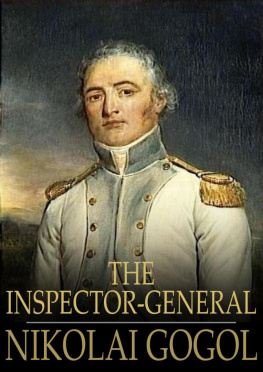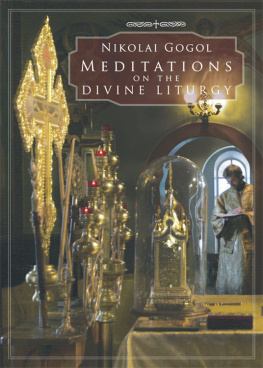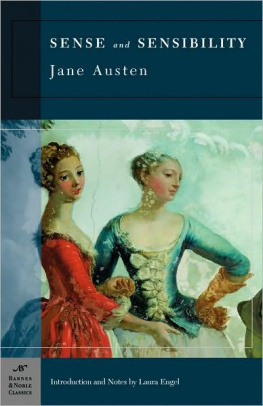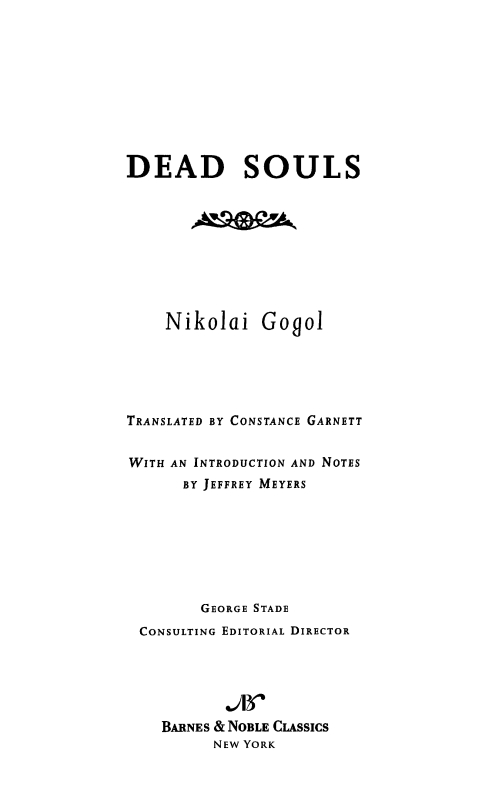
Table of Contents
FROM THE PAGES OF DEAD SOULS
A rather pretty little chaise on springs, such as bachelors, half-pay officers, staff captains, landowners with about a hundred serfsin short, all such as are spoken of as gentlemen of the middling sortdrive about in, rolled in at the gates of the hotel of the provincial town of N.
(page 5)
In the end the fat man, after serving God and his Tsar and winning universal respect, leaves the service, moves away and becomes a landowner, a hearty hospitable Russian gentleman,he gets on, and indeed gets on very well. And when he has gone, his thin heirs in accordance with the Russian tradition make ducks and drakes of all their fathers property. I cannot disguise the fact that such were the reflections which occupied Tchitchikovs mind while he was scrutinising the company and the result was that he finally joined the fat ones, among whom he found all the personages he knew: the public prosecutor with very black thick eyebrows and with the left eye given to winking slightly as though to say: Come into the next room, my boy, I have something to tell you, though he was a serious and taciturn man; the postmaster, a short man who was a wit and a philosopher; the president of the court, a very sagacious and polite man,all of whom welcomed him as an old acquaintance while Tchitchikov responded to their civilities by profuse bows a little to one side but no less agreeable for that. (page 14)
I say, my good man, how many of our peasants have died since the census was taken? (page 32)
Such was Nozdryov! Perhaps he will be called a hackneyed character, and it will be said that there are no Nozdryovs now. Alas! those who say so are wrong. It will be many long years before the Nozdryovs are extinct. They are everywhere among us, and the only difference perhaps is that they are wearing a different cut of coat; but people are carelessly unobservant and a man in a different coat seems to them a different man. (page 72)
A word aptly uttered or written cannot be cut away by an axe.
(page 109)
Another thing I must mention about the ladies of N. is that, like many Petersburg ladies, they were distinguished by great niceness and propriety in their choice of words and expressions. They never said: I blew my nose, I got into a sweat, I spat, but used instead some such expression as: I made use of my handkerchief. (page 161)
And now the officials asked themselves the question which they ought to have asked themselves in the first chapter of my poem. It was decided to make inquiries of the persons from whom the dead souls had been bought, so as to find out at least what sort of transaction it was, and what was to be understood by dead souls. (page 198)
Scratching the head signifies all manner of things among the Russian people. (page 218)
Russia! Russia! I behold thee, from my lovely faraway paradise, I behold thee! It is poor, neglected and comfortless in thee, no insolent marvels of nature crowned by insolent marvels of art, no towns with many-windowed lofty palaces piled in precipitous heights, no picturesque trees, no ivy-clad houses in the roar and everlasting spray of waterfalls rejoice the eye or strike awe into the heart; the head is not turned to gaze at the rocks piled up on the heights above it; no everlasting lines of shining mountains rising into the silvery pure skies gleam in the distance through dark arches, scattered one upon the other in a tangle of vines, ivy and wild roses beyond number. In thee all is open, desolate, flat; thy lowly towns lie scattered like dots, like specks unseen among thy plains; there is nothing to allure or captivate the eye. But what mysterious inexplicable force draws one to thee? Why does the mournful song that floats all over the length and breadth of thee from sea to sea echo unceasingly in the ear? What is in it, in that song? What is it that calls and sobs and clutches at my heart? What are these strains that so poignantly greet me, that go straight to my soul, that throb about my heart? Russia! what wouldst thou of me? What is the mysterious hidden bond between us? Why dost thou gaze at me thus, and why is everything within thee turning upon me eyes full of expectation? (page 223)
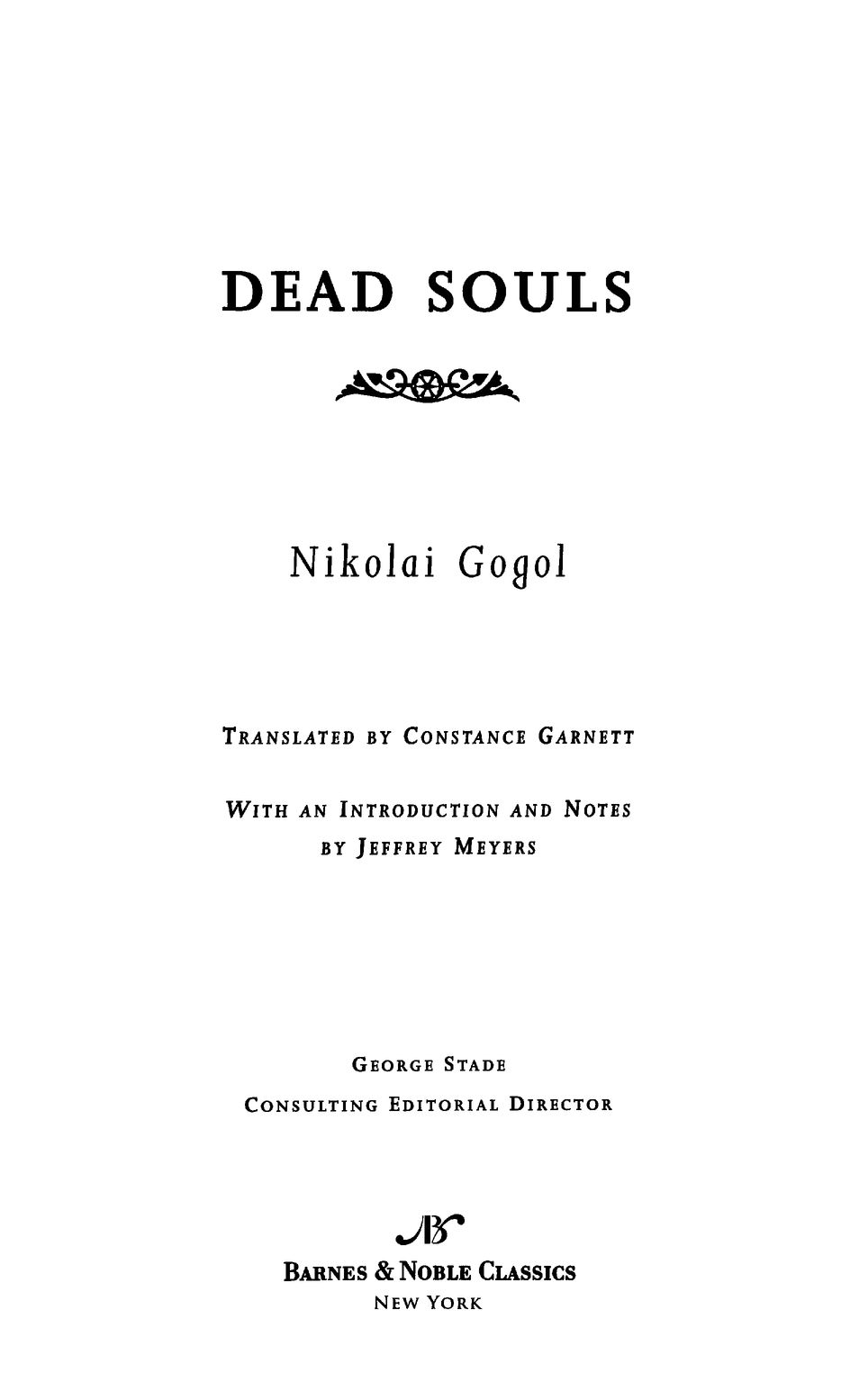
NIKOLAI GOGOL
The Russian intelligentsia was surprised when the great and famously aloof poet Alexander Pushkin welcomed the young writer Gogol into his circle. Few suspected that Gogol would quickly rise to such literary heights. He was, after all, from a small village in Ukraine and had no aristocratic standing or great wealth to speed his career. But ambition, flexibility, luck, and a heady dose of confidence thrust him into stardom and a life of brief but legendary intensity
Born on April 1, 1809. Nikolai Vasilyevich Gogol grew up on his familys estate in Sorochinsty, Ukraine. His father, who died when Nikolai was sixteen, was a minor landowner and an amateur poet and playwright who acted in the plays he wrote and directed. Nikolai received his brief education at a boarding school in Nezhin, where he was schooled in the classics and German Romanticism. At school he first became involved in theater and writing, performing in amateur productions and contributing frequently to the literary magazine.
After graduating, Gogol moved to Russias capital, St. Petersburg, and worked for a time as a government clerk. His real ambitions, however, were creative and literary. After auditioning and being rejected by the Imperial Theater, he turned his energies to writing. In 1829 he self-published the long Romantic poem Hanz Kchelgarten; it was a failure, excoriated by the few critics who bothered to read it, and Gogol bought back and burned every copy he could find. A few years later he published the first of two volumes of tales set in his native Ukraine, Evenings on a Farm Near Dikanka. These works won the hearts of Pushkin as well as of most Russian readers.
Over the next several years, Gogol worked briefly (and unsuccessfully) as an assistant professor of history at St. Petersburg University and published several new works, all well received, including Arabesques, a collection of fiction, essays, and criticism; Mirgorod, another collection of tales; and The Government Inspector, a dramatic comedy.
In 1836 Gogol left Russia and traveled in Germany, Switzerland, and France before settling in Rome, where he wrote his masterpiece, Dead Souls. The novel secured Gogols status as the father of Russian realism and influenced generations of writers, including Dostoevsky, Kafka, and Nabokov.
After living abroad for twelve years, Gogol returned to Russia in 1848. The remaining years of his life were marked by spiritual upheavals and nervous disorders. He turned to extreme religious beliefs and came under the influence thereafter of fanatical Russian monks. Shortly before he died, Gogol destroyed part II of Dead Souls (five chapters were later found). He stopped eating soon afterward and died on March 4, 1852.
THE WORLD OF NIKOLAI GOGOL AND DEAD SOULS
| 1809 | Nikolai Vasilyevich Gogol is born on April 1 on his familys es tate in the village of Sorochintsy, Ukraine (then called Little Russia). His father runs the estate and is an amateur poet and playwright. |
| 1812 | In June Napoleon I of France invades Russia; his retreat and the humiliating defeat of his Grand Army later that year ruin his campaign of conquest. |


